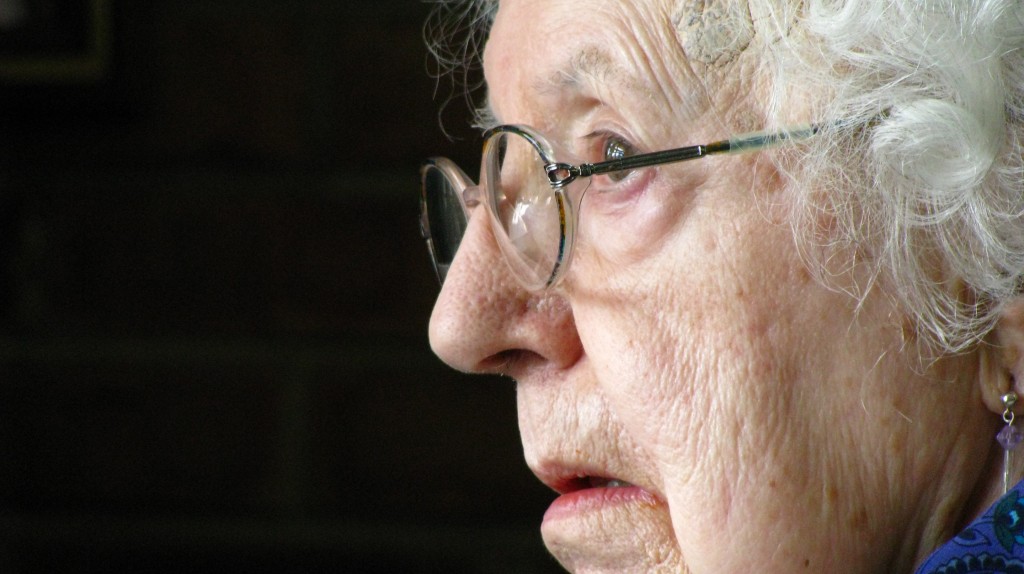That was me. That could be me. That will be me.
 I was tired and ready to go home. It had taken me at least ten minutes to return two items of clothing at the busy wholesale club, which was my last stop in a long list of errands that afternoon. As I piled the items from my full cart on to the conveyer belt, I saw her. She looked so frail. She was with someone younger than her, maybe a daughter or niece. As she was making efforts to pay, I felt slightly irritated. She was writing a paper check (people still actually pay at a retail store by writing a check?!) and was having some trouble understanding the instructions of the clerk. This was all happening in–what seemed to me at the time–slow motion. Each step or arm movement seemed to take minutes instead of seconds. But then I caught the eye of her companion. We exchanged smiles. And I continued to watch that tiny, frail old lady with a little more patience because around that moment, it hit me.
I was tired and ready to go home. It had taken me at least ten minutes to return two items of clothing at the busy wholesale club, which was my last stop in a long list of errands that afternoon. As I piled the items from my full cart on to the conveyer belt, I saw her. She looked so frail. She was with someone younger than her, maybe a daughter or niece. As she was making efforts to pay, I felt slightly irritated. She was writing a paper check (people still actually pay at a retail store by writing a check?!) and was having some trouble understanding the instructions of the clerk. This was all happening in–what seemed to me at the time–slow motion. Each step or arm movement seemed to take minutes instead of seconds. But then I caught the eye of her companion. We exchanged smiles. And I continued to watch that tiny, frail old lady with a little more patience because around that moment, it hit me.
That is going to be me someday.
And I started to think about the different people who so easily frustrate us in life–
The mom with the sick infant that won’t stop screaming in the store or on the airplane.
That was me at one point in my life.
The driver, on their way home from a really terrible meeting or visit, who cuts me off because they are just so distracted.
I’ve been there.
Or the woman paying with food stamps in the grocery store line.
That could be me but for the grace of God.
And I realize that we should really extend so much more grace to people. Why are we so easily frustrated? We could be just like them. Perhaps we were just like them. Or we will be just like them one day in the future.
How do you want people to treat you? That’s the way we should treat others. It is so basic and yet so important.
Do you want your co-workers to tell you the truth? Then extend to them the same courtesy.
Do you want the person behind you in line to be patient as your credit card gets rejected for the third time for some unknown reason? Then do the same when you are that person in line.
What about the overwhelmed waitress? Does she deserve kindness? Would you want kindness if you were in her place–perhaps as new to the job or in a restaurant that is understaffed? God calls us to treat her the way we would want to be treated.
Jesus tells us this basic truth so clearly in Luke 6:31. So why do we struggle so? Why are we so gossipy and easily angered? Why do we backbite and hold grudges? Or sigh and throw tantrums?
I fail at this so often. I don’t mean to, I just get so caught up with my own little, selfish agenda and, woe betide anyone who gets in my way. But for some reason, the elderly lady really made me stop and think. How do I want to be treated when I can’t move as fast as I once did? Because it’s coming. Whether I want it to or not. It’s coming for all of us one day, if we are blessed to live a long life.
You know, if we all followed Luke 6:31 the world we be such a better place. In fact, I believe if Christians followed this commandment, churches would find themselves with few problems.
Of course, that’s in an ideal world, which is certainly not where we live. But it can start with us, can it not? Today, let us be the ones who treat others as we want to be treated. Let’s try to make a difference, however small, by extending grace and kindness to all who cross our path.









